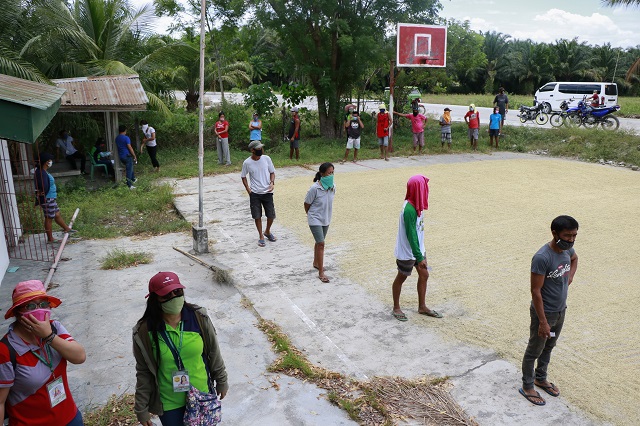
Midsayap, North Cotabato – The Department of Agriculture-Philippine Rice Research Institute (DA-PhilRice) branch station here continues to aid farmers amidst pandemic as the Institute readies about 128,000 bags of seeds to be distributed in south-central Mindanao.
Starting this month until December, farmers registered in the Registry System for Basic Sectors in Agriculture will receive two bags (40 kg) per hectare of certified inbred seeds under the Rice Competitiveness Enhancement Fund (RCEF) – Seed Program.
Farmers can select from national recommended varieties, which include NSIC Rc 222 and 216 and from location-specific varieties: NSIC Rc 400, 440, and PSB Rc 18. Studies show that high-quality seeds can increase harvest by 10 percent or more as these seeds have high seedling vigor and purity, and ensure uniformity of crop stand.
Benefitting about 68,000 farmers, the program aimed to cover close to 64,000 ha of rice areas come dry season.
Last wet season, PhilRice Midsayap and its partner agencies including the DA-Regional Field Offices had distributed more than 100 percent of the total seed allocation in 33 municipalities in Region 9 and 46 municipalities in Region 12. The program reached 15,000 farmer-recipients amidst community quarantines.
Dr. Sailila E. Abdula, PhilRice-Midsayap branch station director, said partners agencies and local government units implemented strict guidelines to avoid mass gathering and lessen health risk.
In Isulan, Sultan Kudarat, agriculturists delivered the seeds to farmers’ houses while in Molave, Zamboanga del Sur, implementers release seeds through barangay scheduling. Checking temperature at the entrance, wearing of mask, and following the 1-meter distance were also required.
Farmers were also given with a brochure on modern rice farming. Meanwhile, farmer trainees and cooperative members under the RCEF-Rice Extension Services Program will receive a primer on PalayCheck, an integrated crop management system for rice. PalayCheck System booklet will also be distributed to rice specialists and trainers.
“We are grateful to our policymakers and supporters for their continuing reinforcement. Our farmers need our support so they can plant high-quality seeds, which contribute to food security,” Abdula, program lead in Midsayap, which won the recent Best RCEF-Seed Implementer Award given by PhilRice’s Gantimpala Agad Award, said.
RCEF, which is a component of Republic Act 11203 or Rice Tariffication Law signed by Pres. Rodrigo Duterte, allots P10 billion fund every year for the rice farmers. Sponsored by Sen. Cynthia Villar, the program is a six-year government initiative to help the farmers compete in the international rice market. The local government units and lawmakers assist in its implementation.
PhilRice leads the RCEF-Seed Program and is the government’s lead agency on rice research and development mandated to help ensure a rice-secure Philippines. With eight stations across the country, its programs and projects are in line with the DA’s “Masaganang Ani, Mataas na Kita” battlecry. For more information about the Institute’s program, queries can be sent thru PhilRice Text Center (0917 111 7423) or email prri.mail@philrice.gov.ph.




